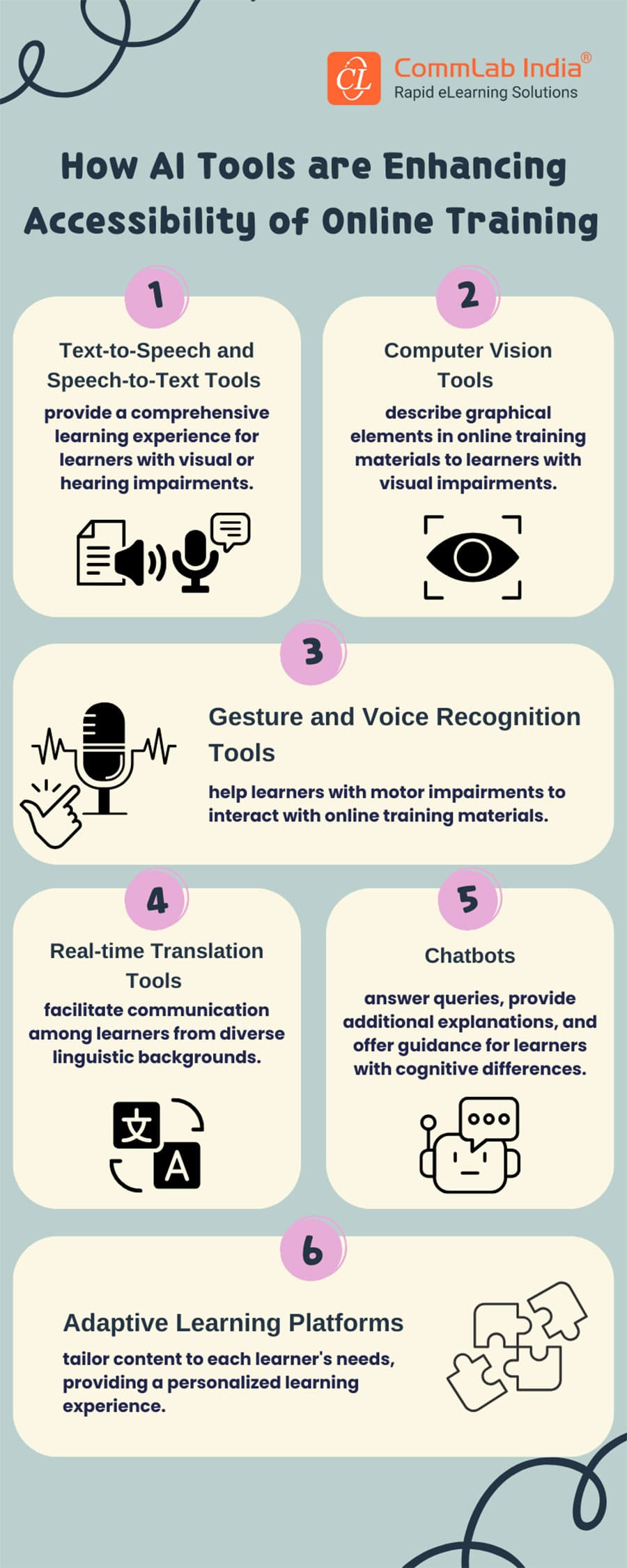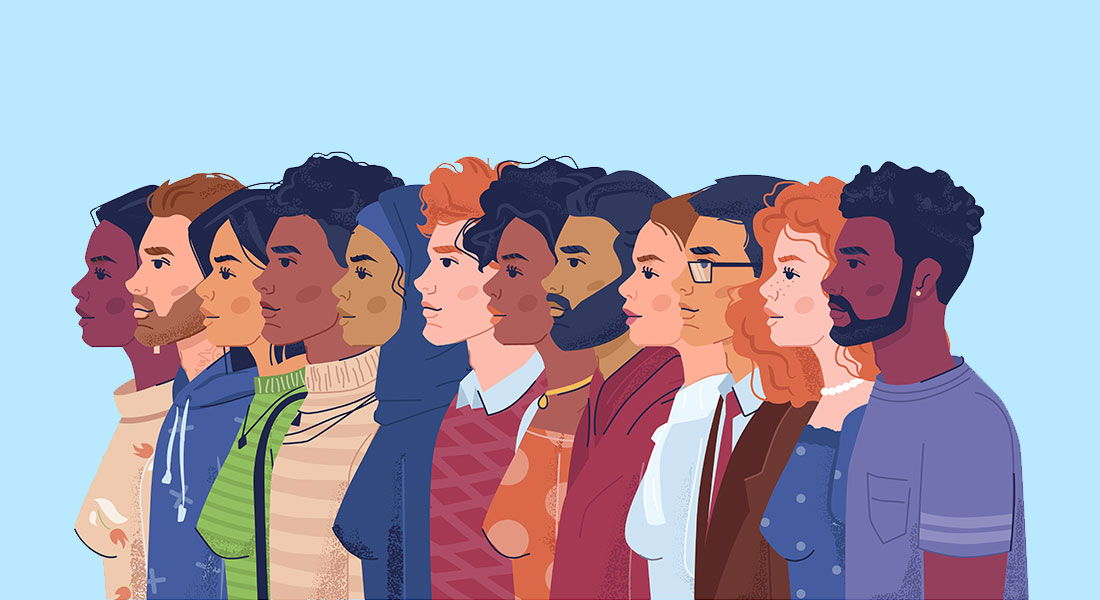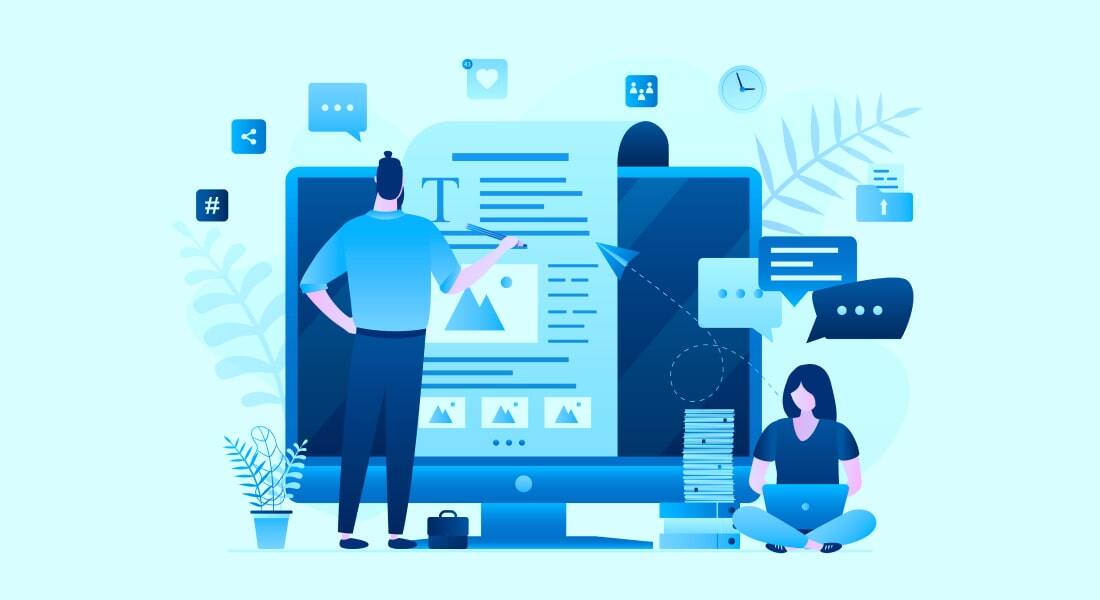How does AI Foster Accessibility in Online Training [Infographic]
![How does AI Foster Accessibility in Online Training [Infographic] How does AI Foster Accessibility in Online Training [Infographic]](https://blog.commlabindia.com/hubfs/blogs/online-training-ai-accessibility-info.jpg)
The advent of online learning has revolutionized access to an expansive repository of knowledge and ideas. The digital era has ushered in offering innumerable learning opportunities. Yet, amid this wealth of information, a significant challenge persists in online training – the accessibility gap faced by individuals with disabilities. Despite the transformative potential of online content, many encounter barriers that hinder their ability to fully engage with and benefit from the vast pool of knowledge available.
This blog will explore how AI technologies are increasingly recognized for their potential to dismantle accessibility barriers, making online content more inclusive and available to individuals with diverse abilities.
What is Accessibility in Online Training?
Accessibility in online training enables learning for all learners, regardless of their abilities or challenges, can fully engage with course materials and activities. This means considering diverse needs and implementing strategies to overcome barriers, making the learning experience accessible to every participant. This includes providing content in multiple formats, intuitive navigation, compatibility with assistive technologies, flexible assessment methods, and features like captioning and transcription. By prioritizing accessibility, organizations create inclusive learning environments where all individuals have equal learning opportunities. This not only fulfills legal and ethical obligations but also promotes diversity, equity, and inclusivity in learning.
→ Download Now: Developing Effective Online Training Programs [Checklist]
How does AI Help with Accessibility in Online Training?
AI contributes significantly to improving accessibility in online training through its ability to provide personalized and adaptive learning experiences. AI-powered tools can analyze vast amounts of data about learners' interactions with course materials, identify patterns, and adapt the content and presentation in real-time to better suit individual needs. For example, AI algorithms can adjust the pace of instruction, provide additional explanations or examples for concepts that learners struggle with, and offer alternative formats for content consumption based on preferences or accessibility requirements.
Furthermore, AI tools enables the development of innovative assistive technologies that assist individuals with disabilities in accessing online training materials more effectively. For instance, speech recognition software can facilitate hands-free navigation and interaction for learners with mobility impairments, while natural language processing capabilities can enable real-time translation of course content for learners with language barriers. By harnessing the power of AI in online training, organizations empower learners of diverse abilities and ultimately provide a more accessible learning experience for all participants.
Why Should AI Be Employed for Accessibility in Online Training?
- Personalized learning experiences tailored to specific learner needs.
- Automated captioning and transcriptions for multimedia content.
- Adaptive assessments that adjust difficulty based on learner performance.
- Natural language processing for intuitive user interfaces and interaction.
- Image recognition for describing visual content to visually impaired learners.
- Automated text-to-speech functionality for auditory learners.
- Virtual assistants for answering questions and providing guidance in real-time.
- Enhanced navigation and usability features for learners with motor disabilities.
How Do AI Tools Improve Online Training Accessibility?
Towards an Accessible Future of Online Training
The integration of AI in online training holds immense potential to expand, rather than restrict, accessibility for all learners. By leveraging the potential of AI thoughtfully, organizations can unlock new possibilities for customization and personalization, ensuring that every individual's learning needs are met. As we strive to create equitable learning environments, it is essential to embrace innovative technologies like AI as allies in our pursuit of accessibility in training. To delve deeper into designing effective online training programs, download our handy checklist that will help you get started.




![Online Training — How to Develop Effective Programs [Checklist]](https://no-cache.hubspot.com/cta/default/59327/ae131a0f-e51b-4928-8e55-88f70c46a14e.png)

![Why Should You Explore Generative AI for L&D? [ANSWERED]](https://blog.commlabindia.com/hubfs/blogs/generative-ai-why-l%26d-teams.jpg)
